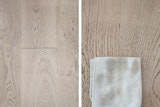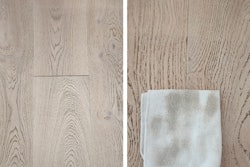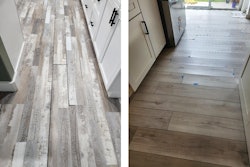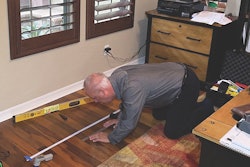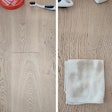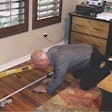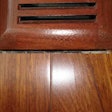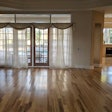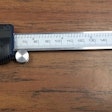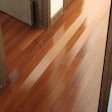Once or twice a week when I arrive for a wood floor inspection, the homeowner greets me at the door and tells me that he or she had no idea that there are people who are independent floor covering inspectors. Sometimes members of the industry are also unaware of our existence. They want to know how it is that some person with no apparent connection to the purchase of the flooring gets called into a dispute. Inspections such as mine are happening more than ever; I'll describe one fairly typical scenario, as well as what people should expect from a professional wood flooring inspection.
Harry Homeowner goes to his local floor covering seller. He agrees to spend $12,000 to have a new factory-finished hardwood floor installed in his house. The flooring is delivered to the house and installed, and the homeowner has some concerns about how the floor looks. He tries to discuss the issues with the flooring installer, but he isn't able to make himself understood. He calls the seller to express his concerns. The seller assures him that the issues he is concerned about are normal for wood floors. Harry is not convinced what he sees is normal. Harry decides to withhold the final $4,000 payment.
The issues may or may not be important, but they certainly are important to Harry, particularly given the large sum of money he is spending (and, now, the money he is withholding). Harry and the seller reach an impasse. The seller decides to ask the installer to go back out to the house and look at the floor again. The installer goes out, walks around the floor and reports back that his installation is fine. Harry isn't convinced. The seller calls his distributor and asks him to go look at the floor. The distributor's representative comes out to the house, looks at the floor and reports back to the seller that he doesn't see anything wrong with the flooring. Harry continues to hold onto the last $4,000. The seller realizes he must send someone who has no financial interest in the result—a certified inspector—out to look at the floor.
The seller may know a certified inspector in the area, or maybe he asks his distributor to recommend one. If the distributor doesn't have a recommendation, the seller may search on the Internet. He may call one of the national associations (like NWFA Certified Professionals and NOFMA: The Wood Flooring Manufacturers Association) and ask them to recommend someone. He makes sure that the individual he chooses has credentials demonstrating that the inspector is qualified to do the job. He may ask for references.
The inspector gets the assignment containing all of the information needed to conduct the inspection. The list of information includes Harry Homeowner's address, phone number(s) and product data (manufacturer, product number, description of the product, color, square footage, etc.). The seller reports what the installer said about the job, then what the distributor said about the job. Finally, he reports what Harry Homeowner said about the job.
The inspector contacts Harry Homeowner, and an agreement is made about a date and a time for the inspection. The inspector comes to the house and asks Harry to explain the nature of his concerns with the hardwood flooring, listening attentively. Harry may be quite upset about the manner in which his concerns have been addressed up to this moment. The inspector continues to listen. After Harry has concluded his explanation about the issues, the inspector may repeat them back to Harry to be certain he understands them. With a full understanding of Harry's concerns, the inspector begins to gather data about the floor. The data gathered may include inquiries about whether the seller or his representative visited the house beforehand and assessed the suitability of the site for the type of installation being done, took moisture readings, etc.
When was the flooring delivered? Where was it stored? The inspector continues the assessment by gathering data about the conditions in the home. The data includes temperature, relative humidity and moisture content of the flooring. If the floor is nailed, how are nails spaced? What are the dimensions of the flooring? Are there gaps between boards, and if so, how many, how large, and when were they first noticed?
Once the inspector has gathered all of the information that is deemed important, Harry is thanked for his time and assistance in gathering the data. The inspector informs Harry that the data will be used to create a report. If asked, the inspector will state, politely, that he is unable to offer any verbal assessment at the time of the inspection, and that the report will be sent to the party that commissioned the inspection.
The interested parties in a dispute frequently expect the inspector to provide them with a one- to three-word answer that will ascribe all the responsibility to one party. Experience shows this is rarely the case. There may be conditions that should have been noticed at the time of manufacture, issues that should have been addressed during the planning process, site conditions that should have been controlled by a builder, issues with individual boards that should have been addressed by the contractor installing the floor, and unreasonable expectations on the part of the end user.
Later, the inspector draws together all the information that was gathered. A report is created predicated on the facts and in light of the manufacturer's instructions and applicable industry guidelines. The inspector makes certain that the conclusions drawn are supported by the data collected, and the report is sent to the commissioning party.
The mechanics of each transaction may differ somewhat, and the facts will vary from case to case, but the basics remain the same. The certified independent inspector is called in because he or she has no vested financial interest in the outcome. The inspector is expected to gather the appropriate data and then draw a conclusion that is supported by the data. The interested parties may then find it easier to find a way to resolve the dispute. If the parties are unable to agree on a remedy based on the report, it may also serve as the basis on which to achieve a mandated settlement in a court of law.









